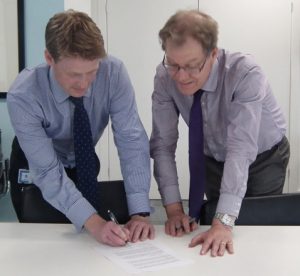That looks very dramatic, doesn’t it? But I assure you that we have very amicable relations with the Information Commissioner’s Office (ICO) and have never had to think about, let alone resort to, violence!
However the relationship is complicated because although we occupy some of the same space – we both deal with information in various ways – we are usually doing different things in that space. Take regulation: ICO regulates our handling of personal data and our performance under FOI, but we regulate their performance under the Re-use of Public Sector Information Regulations. It is not beyond the bounds of possibility that we might find ourselves simultaneously dealing with a complaint against each other – but fortunately that has not yet happened.
We need to work closely together on records management, particularly with regard to government departments and other bodies falling under the Public Records Act (PRA) which include, incidentally, ICO. Under the PRA, the Keeper of Public Records (our Chief Executive) guides, co-ordinates and supervises records managment in these bodies. However, there is also a code of practice on records management under section 46 of the Freedom of Information Act (FOIA) and ICO promotes and monitors government departments’ performance against it. So, we monitor their records management under PRA and they monitor our records management under FOIA and we both monitor records management in government departments. Now the last thing a busy government department needs is conflicting advice and expectations and a succession of visits to assess their performance, so we try to work together to ensure we follow a consistent line and we timetable our assessment visits carefully.
We also need to talk to each other when a complaint received by one of us seems to fall partly within the remit of the other. In theory access and re-use are completely distinct but in practice the boundaries can be a bit fuzzy. So, we need to liaise when this happens. We also need to ensure our respective guidance on access and re-use is coherent and avoids confusing public authorities and members of the public. And we can offer specialist expertise when issues arise involving archives, which ties in well with our sector leadership role (on which colleagues have already blogged).

Oliver Morley and Christopher Graham sign the Memorandum of Understanding
With all this going on we need more than ad hoc liaison so we have a formal agreement on how we will work together. We recently revised it and our new Memorandum of Understanding was signed a couple of weeks ago by Oliver Morley, our Chief Executive and Keeper, and Christopher Graham, the Information Commissioner. The new Memorandum of Understanding is published on our website today.
It seems to me to be a concern that TNA and the ICO are so closely linked. As you have said Susan there has not be a situation whereby there has been a complaint by the ICO against TNA but it seems to me that this possibility should have been addressed and a third party involved. It is part of governance that the possibility exists and in my view there should be a clear transparent policy for the public to be reassured on what happens if this situation was to arise, for example if TNA did not met the 30/20-year rule or did not give out a licence for re-use of data. As the Memorandum of Understanding states it is not legally binding.
David, just to clarify, I said that there have not been simultaneous complaints requiring each of us to investigate the other. ICO has handled several complaints against us under the FOI Act and, as we would expect, done so with complete propriety. And that does not mean they have always found in our favour because they have not. The MoU says quite clearly in several places that it does not compromise ICO’s regulatory independence and we both recognise how important that is.